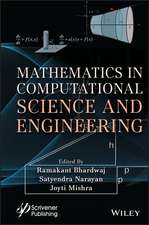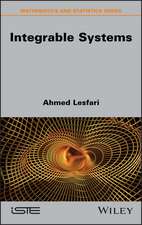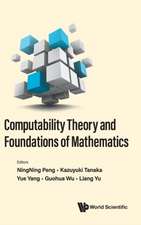SCADA Security – Machine Learning Concepts for Intrusion Detection and Prevention: Wiley Series on Parallel and Distributed Computing
Autor A Almalawien Limba Engleză Hardback – 24 feb 2021
Din seria Wiley Series on Parallel and Distributed Computing
- 9%
 Preț: 966.88 lei
Preț: 966.88 lei - 9%
 Preț: 1010.51 lei
Preț: 1010.51 lei - 9%
 Preț: 1043.04 lei
Preț: 1043.04 lei - 9%
 Preț: 883.95 lei
Preț: 883.95 lei - 9%
 Preț: 958.11 lei
Preț: 958.11 lei - 9%
 Preț: 1148.99 lei
Preț: 1148.99 lei - 9%
 Preț: 1041.33 lei
Preț: 1041.33 lei - 9%
 Preț: 1027.95 lei
Preț: 1027.95 lei - 9%
 Preț: 855.39 lei
Preț: 855.39 lei - 9%
 Preț: 1349.96 lei
Preț: 1349.96 lei - 9%
 Preț: 1042.36 lei
Preț: 1042.36 lei - 9%
 Preț: 1149.31 lei
Preț: 1149.31 lei - 9%
 Preț: 1132.51 lei
Preț: 1132.51 lei - 9%
 Preț: 831.27 lei
Preț: 831.27 lei - 9%
 Preț: 984.96 lei
Preț: 984.96 lei - 9%
 Preț: 1123.77 lei
Preț: 1123.77 lei - 9%
 Preț: 1129.03 lei
Preț: 1129.03 lei - 9%
 Preț: 1011.94 lei
Preț: 1011.94 lei - 9%
 Preț: 765.84 lei
Preț: 765.84 lei - 9%
 Preț: 849.58 lei
Preț: 849.58 lei - 9%
 Preț: 718.25 lei
Preț: 718.25 lei - 9%
 Preț: 734.14 lei
Preț: 734.14 lei - 9%
 Preț: 771.63 lei
Preț: 771.63 lei - 9%
 Preț: 701.27 lei
Preț: 701.27 lei - 9%
 Preț: 692.84 lei
Preț: 692.84 lei - 9%
 Preț: 715.23 lei
Preț: 715.23 lei - 9%
 Preț: 1032.74 lei
Preț: 1032.74 lei - 9%
 Preț: 796.60 lei
Preț: 796.60 lei - 32%
 Preț: 969.36 lei
Preț: 969.36 lei - 32%
 Preț: 1302.92 lei
Preț: 1302.92 lei - 31%
 Preț: 1039.20 lei
Preț: 1039.20 lei - 31%
 Preț: 1022.97 lei
Preț: 1022.97 lei - 32%
 Preț: 938.97 lei
Preț: 938.97 lei - 32%
 Preț: 606.19 lei
Preț: 606.19 lei - 32%
 Preț: 575.46 lei
Preț: 575.46 lei - 31%
 Preț: 758.33 lei
Preț: 758.33 lei - 32%
 Preț: 863.08 lei
Preț: 863.08 lei - 32%
 Preț: 781.12 lei
Preț: 781.12 lei - 32%
 Preț: 577.29 lei
Preț: 577.29 lei - 32%
 Preț: 640.10 lei
Preț: 640.10 lei - 30%
 Preț: 738.50 lei
Preț: 738.50 lei - 30%
 Preț: 507.94 lei
Preț: 507.94 lei - 31%
 Preț: 700.08 lei
Preț: 700.08 lei
Preț: 722.82 lei
Preț vechi: 840.49 lei
-14% Nou
Puncte Express: 1084
Preț estimativ în valută:
138.33€ • 150.20$ • 116.20£
138.33€ • 150.20$ • 116.20£
Carte disponibilă
Livrare economică 01-15 aprilie
Preluare comenzi: 021 569.72.76
Specificații
ISBN-13: 9781119606031
ISBN-10: 1119606039
Pagini: 224
Dimensiuni: 158 x 234 x 16 mm
Greutate: 0.48 kg
Editura: Wiley
Seria Wiley Series on Parallel and Distributed Computing
Locul publicării:Hoboken, United States
ISBN-10: 1119606039
Pagini: 224
Dimensiuni: 158 x 234 x 16 mm
Greutate: 0.48 kg
Editura: Wiley
Seria Wiley Series on Parallel and Distributed Computing
Locul publicării:Hoboken, United States
Notă biografică
ABDULMOHSEN ALMALAWI, PHD, is Assistant Professor, Department of Computer Science, University of King Abdulaziz, Saudi Arabia. His research is focused on machine learning. He is co-author of Network Classification for Traffic Management. ZAHIR TARI, PHD, is Professor at RMIT University, Australia. He is on the editorial board of several journals, including ACM Computing Surveys, IEEE Transactions on Computers, IEEE Transactions on Parallel and Distributed Systems, and IEEE Cloud Computing. ADIL FAHAD, PHD, is Assistant Professor, Department of Computer Science, University of Albaha, Saudi Arabia. His research interests are in the areas of wireless sensor networks, mobile networks, SCADA security, and ad-hoc networks with emphasis on data mining, statistical analysis/modelling, and machine learning. XUN YI, PHD, is Professor, School of Computer Science and Information Technology, RMIT University, Australia. He has published more than 150 research papers in international journals and has led several Australia Research Council (ARC) Discovery projects. He is Associate Editor of IEEE Transactions on Dependable and Secure Computing.























